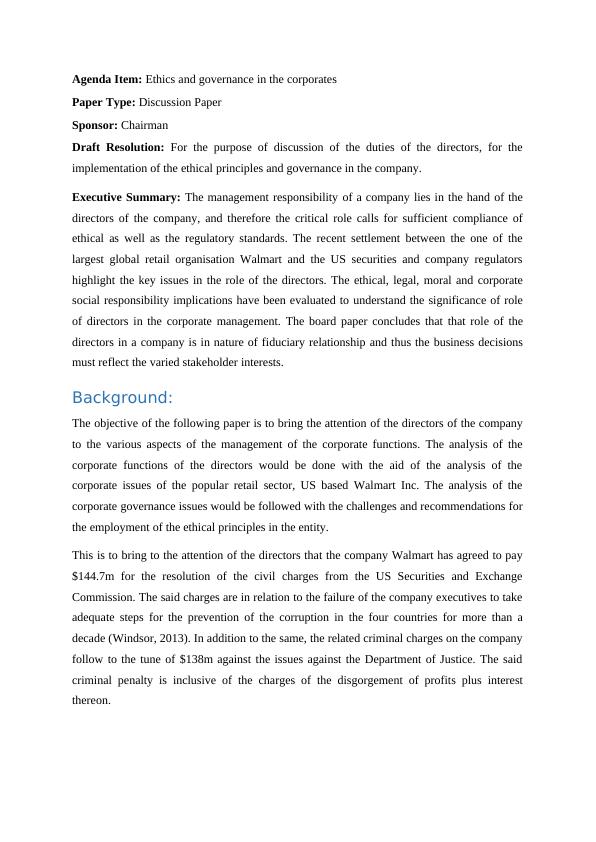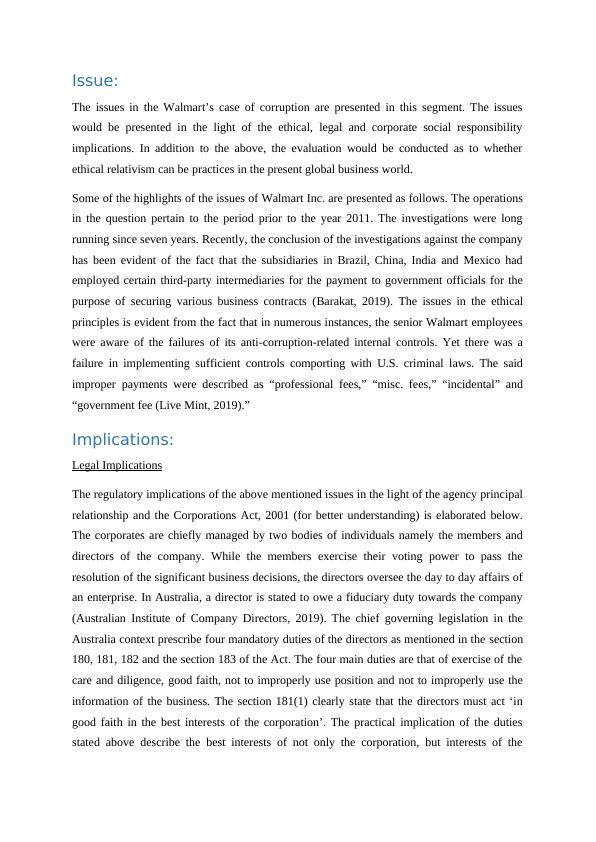Ethics and Governance in Corporates
Added on 2022-12-01
8 Pages2708 Words354 Views
ETHICS AND GOVERNANCE

Agenda Item: Ethics and governance in the corporates
Paper Type: Discussion Paper
Sponsor: Chairman
Draft Resolution: For the purpose of discussion of the duties of the directors, for the
implementation of the ethical principles and governance in the company.
Executive Summary: The management responsibility of a company lies in the hand of the
directors of the company, and therefore the critical role calls for sufficient compliance of
ethical as well as the regulatory standards. The recent settlement between the one of the
largest global retail organisation Walmart and the US securities and company regulators
highlight the key issues in the role of the directors. The ethical, legal, moral and corporate
social responsibility implications have been evaluated to understand the significance of role
of directors in the corporate management. The board paper concludes that that role of the
directors in a company is in nature of fiduciary relationship and thus the business decisions
must reflect the varied stakeholder interests.
Background:
The objective of the following paper is to bring the attention of the directors of the company
to the various aspects of the management of the corporate functions. The analysis of the
corporate functions of the directors would be done with the aid of the analysis of the
corporate issues of the popular retail sector, US based Walmart Inc. The analysis of the
corporate governance issues would be followed with the challenges and recommendations for
the employment of the ethical principles in the entity.
This is to bring to the attention of the directors that the company Walmart has agreed to pay
$144.7m for the resolution of the civil charges from the US Securities and Exchange
Commission. The said charges are in relation to the failure of the company executives to take
adequate steps for the prevention of the corruption in the four countries for more than a
decade (Windsor, 2013). In addition to the same, the related criminal charges on the company
follow to the tune of $138m against the issues against the Department of Justice. The said
criminal penalty is inclusive of the charges of the disgorgement of profits plus interest
thereon.
Paper Type: Discussion Paper
Sponsor: Chairman
Draft Resolution: For the purpose of discussion of the duties of the directors, for the
implementation of the ethical principles and governance in the company.
Executive Summary: The management responsibility of a company lies in the hand of the
directors of the company, and therefore the critical role calls for sufficient compliance of
ethical as well as the regulatory standards. The recent settlement between the one of the
largest global retail organisation Walmart and the US securities and company regulators
highlight the key issues in the role of the directors. The ethical, legal, moral and corporate
social responsibility implications have been evaluated to understand the significance of role
of directors in the corporate management. The board paper concludes that that role of the
directors in a company is in nature of fiduciary relationship and thus the business decisions
must reflect the varied stakeholder interests.
Background:
The objective of the following paper is to bring the attention of the directors of the company
to the various aspects of the management of the corporate functions. The analysis of the
corporate functions of the directors would be done with the aid of the analysis of the
corporate issues of the popular retail sector, US based Walmart Inc. The analysis of the
corporate governance issues would be followed with the challenges and recommendations for
the employment of the ethical principles in the entity.
This is to bring to the attention of the directors that the company Walmart has agreed to pay
$144.7m for the resolution of the civil charges from the US Securities and Exchange
Commission. The said charges are in relation to the failure of the company executives to take
adequate steps for the prevention of the corruption in the four countries for more than a
decade (Windsor, 2013). In addition to the same, the related criminal charges on the company
follow to the tune of $138m against the issues against the Department of Justice. The said
criminal penalty is inclusive of the charges of the disgorgement of profits plus interest
thereon.

Issue:
The issues in the Walmart’s case of corruption are presented in this segment. The issues
would be presented in the light of the ethical, legal and corporate social responsibility
implications. In addition to the above, the evaluation would be conducted as to whether
ethical relativism can be practices in the present global business world.
Some of the highlights of the issues of Walmart Inc. are presented as follows. The operations
in the question pertain to the period prior to the year 2011. The investigations were long
running since seven years. Recently, the conclusion of the investigations against the company
has been evident of the fact that the subsidiaries in Brazil, China, India and Mexico had
employed certain third-party intermediaries for the payment to government officials for the
purpose of securing various business contracts (Barakat, 2019). The issues in the ethical
principles is evident from the fact that in numerous instances, the senior Walmart employees
were aware of the failures of its anti-corruption-related internal controls. Yet there was a
failure in implementing sufficient controls comporting with U.S. criminal laws. The said
improper payments were described as “professional fees,” “misc. fees,” “incidental” and
“government fee (Live Mint, 2019).”
Implications:
Legal Implications
The regulatory implications of the above mentioned issues in the light of the agency principal
relationship and the Corporations Act, 2001 (for better understanding) is elaborated below.
The corporates are chiefly managed by two bodies of individuals namely the members and
directors of the company. While the members exercise their voting power to pass the
resolution of the significant business decisions, the directors oversee the day to day affairs of
an enterprise. In Australia, a director is stated to owe a fiduciary duty towards the company
(Australian Institute of Company Directors, 2019). The chief governing legislation in the
Australia context prescribe four mandatory duties of the directors as mentioned in the section
180, 181, 182 and the section 183 of the Act. The four main duties are that of exercise of the
care and diligence, good faith, not to improperly use position and not to improperly use the
information of the business. The section 181(1) clearly state that the directors must act ‘in
good faith in the best interests of the corporation’. The practical implication of the duties
stated above describe the best interests of not only the corporation, but interests of the
The issues in the Walmart’s case of corruption are presented in this segment. The issues
would be presented in the light of the ethical, legal and corporate social responsibility
implications. In addition to the above, the evaluation would be conducted as to whether
ethical relativism can be practices in the present global business world.
Some of the highlights of the issues of Walmart Inc. are presented as follows. The operations
in the question pertain to the period prior to the year 2011. The investigations were long
running since seven years. Recently, the conclusion of the investigations against the company
has been evident of the fact that the subsidiaries in Brazil, China, India and Mexico had
employed certain third-party intermediaries for the payment to government officials for the
purpose of securing various business contracts (Barakat, 2019). The issues in the ethical
principles is evident from the fact that in numerous instances, the senior Walmart employees
were aware of the failures of its anti-corruption-related internal controls. Yet there was a
failure in implementing sufficient controls comporting with U.S. criminal laws. The said
improper payments were described as “professional fees,” “misc. fees,” “incidental” and
“government fee (Live Mint, 2019).”
Implications:
Legal Implications
The regulatory implications of the above mentioned issues in the light of the agency principal
relationship and the Corporations Act, 2001 (for better understanding) is elaborated below.
The corporates are chiefly managed by two bodies of individuals namely the members and
directors of the company. While the members exercise their voting power to pass the
resolution of the significant business decisions, the directors oversee the day to day affairs of
an enterprise. In Australia, a director is stated to owe a fiduciary duty towards the company
(Australian Institute of Company Directors, 2019). The chief governing legislation in the
Australia context prescribe four mandatory duties of the directors as mentioned in the section
180, 181, 182 and the section 183 of the Act. The four main duties are that of exercise of the
care and diligence, good faith, not to improperly use position and not to improperly use the
information of the business. The section 181(1) clearly state that the directors must act ‘in
good faith in the best interests of the corporation’. The practical implication of the duties
stated above describe the best interests of not only the corporation, but interests of the

End of preview
Want to access all the pages? Upload your documents or become a member.
Related Documents
Ethics and Governance: Governance in Globalised Environmentlg...
|8
|2651
|150
Ethics and Governance Research Paper 2022lg...
|10
|2850
|17
Assignment On Board Briefing Paperlg...
|8
|2662
|26
HIH Insurance Scandal: Legal, Ethical, and Corporate Governance Issueslg...
|14
|3624
|43
Mechanisms of Governance in Policing and Securitylg...
|6
|1502
|26
Assignment about What is Ethical Issues?lg...
|8
|2094
|31